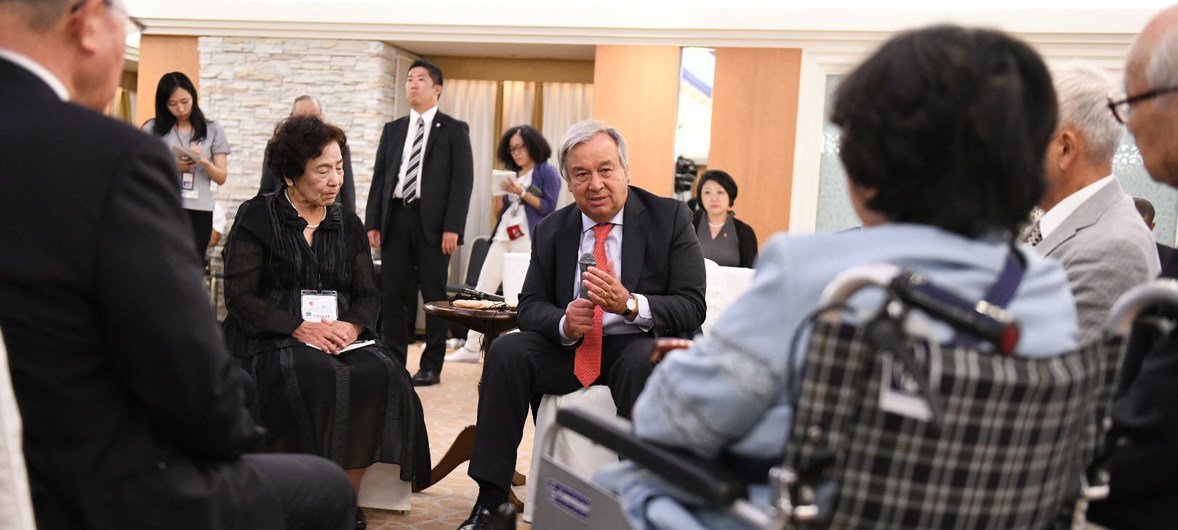The High-Level Meeting was held to commemorate the International Day for the Total Elimination of Nuclear Weapons, observed annually on 26 September.
“There should be no place for these devices of death in our world,” said UN Secretary-General António Guterres.
Nuclear ‘spectre’ looming
He warned, however, that “not since the worst days of the Cold War has the spectre of nuclear weapons cast such a dark shadow.”
He said that “nuclear sabre-rattling has reached a fever pitch” and there have been threats to use a nuclear weapon, highlighting fears of a new arms race.
Meanwhile, decades-old norms established against the use, spread and testing of nuclear weapons are being eroded.

Secretary-General António Guterres meets with survivors of the atomic bomb attacks on Nagasaki and Hiroshima.
Learn from the past
Mr. Guterres said the first-hand experience of the hibakusha – the survivors of the atomic bombing of the Japanese cities of Hiroshima and Nagasaki – “stand as clear reminders of where the nuclear path ends”.
“They continue to sound the alarm, reminding us that we cannot afford to forget the lessons learned from those horrifying nuclear attacks in 1945,” he said.
“And yet, nearly 80 years later, nuclear-weapon States continue to roll the dice, resisting disarmament measures and believing that, somehow, our luck will never run out.”
Stop gambling with our future
He appealed for nuclear-weapon States to “stop gambling with humanity’s future”, starting with honouring their commitments and meeting their disarmament obligations.
“Until nuclear weapons are eliminated, these States should commit to never use them under any circumstances. And they must demonstrate the utmost transparency in all matters related to nuclear weapons,” he said.
Appeal to Russia and USA
The Secretary-General also called on Russia and the United States “to return to the process of nuclear arms reductions, with other nuclear-weapon States following in due course.”
As “disarmament and non-proliferation are two sides of the same coin,” countries must pursue both as a matter of urgency, he added.
He recalled that the recently concluded Summit of the Future resulted in new international commitment to revitalize the global disarmament regime and to bring the world closer to the goal of total elimination of nuclear weapons, which the vast majority of UN Member States support.
“The time has come to take steps to ensure that a nuclear weapon is never used again,” he said.
‘Nuclear catastrophe’ risk mounting: General Assembly President
UN General Assembly President Philémon Yang lamented the current era of heightened nuclear risks.
“We are also observing a growing nexus between nuclear weapons and domains such as outer and cyber space, and technologies such as artificial intelligence, which are multiplying the danger of a nuclear catastrophe,” he said.
Mr. Yang gave an overview of the breakdown in international efforts, including the failure to reach consensus at the 2022 conference to review the Non-Proliferation Treaty (NPT).
The following year also saw Russia withdraw its ratification of the UN-backed Comprehensive Nuclear-Test-Ban Treaty (CTBT), as well as the suspension of the New START (Strategic Arms Reduction Treaty) between the country and the US.
“Not only is the disarmament and non-proliferation regime being eroded, but the disarmament forums, which should be the venues for States to come together and elaborate solutions, are increasingly becoming venues for recriminations and consensus breaking,” he remarked.
Warnings going unheard: Marshall Islands President
The President of the Marshall Islands, Heidi Heine, spoke about her country’s experience, history and current challenges with nuclear exposure.
From 1946 to 1958, while under a Strategic UN Trusteeship administered by the USA, the Pacific Island nation was subjected to 67 known atmospheric nuclear and thermonuclear weapons tests – “the equivalent of 1.6 Hiroshima shots, every day, for 12 years,” she said.
Her relative, Dwight Heine, stood before the Trusteeship Council in 1954 and 1956 with a petition calling for an end to the tests, “but the cries of our people were brushed off, and the promises of our well-being made in two UN resolutions remain unmet – seven decades later.”
President Heine said the Marshall Islands remain gravely concerned about the growing risk of proliferation and detonation, both globally and in the Pacific rim.
“The world is slipping backwards into deeper nuclear risk,” she said. “And again, decades later, in the very same room, our pleas and warnings on the consequences of nuclear detonation seem again unheard by those with their finger on the button.”